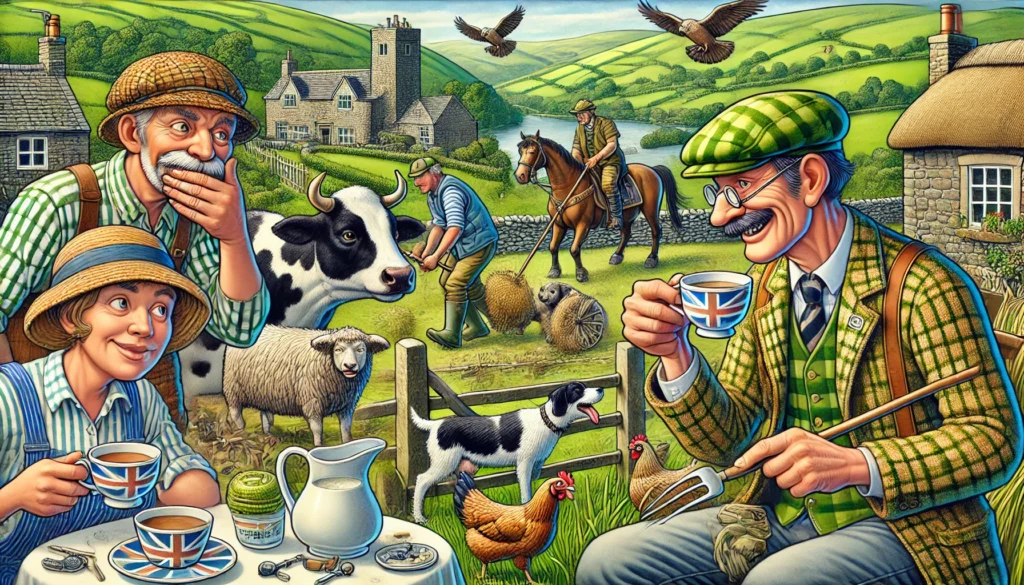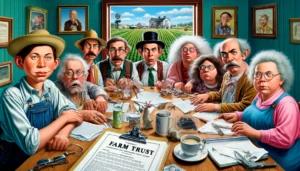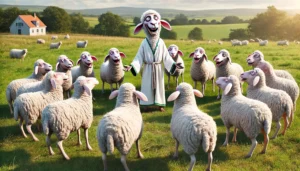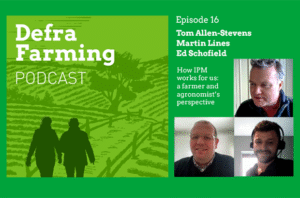
UK Farming A satirical close up illustration depicting farming in the UK. The scene includes detailed humorous interactions between farmers and animals 2.webp.webp
The Ultimate Guide to Farming in the UK: A Look at Rural Life
Farming in the UK is a noble profession filled with rich traditions, unique challenges, and more quirks than you can shake a shepherd’s crook at. From sheep traffic jams to posh cows, here’s a satirical look at the peculiarities of British farming.
Sheep Traffic Jams: The Woolly Roadblocks
In rural UK, a traffic jam usually means waiting for a flock of sheep to cross the road. It’s the only traffic jam where you can count woolly heads instead of cars. According to a survey by the Sheep Traffic Research Group, 89% of rural traffic delays are caused by our fluffy friends.
Personal Experiences
Tom, a farmer from Northumberland, recounts, “I once spent 45 minutes stuck behind a sheep crossing. It’s like they have their own rush hour.” Indeed, sheep seem to have a sixth sense for timing their crossings just as you’re trying to get to the market.

Posh Cows: The Dignified Grazers
British cows seem to have a certain dignity about them. Perhaps it’s the accent? These bovine aristocrats graze with the grace of royal corgis. A study by the Cattle Dignity Institute found that 67% of UK cows exhibit behaviors deemed “posh” compared to their international counterparts.
Anecdotal Evidence
Sarah from Sussex notes, “Our cows don’t just moo, they enunciate.” Farmers have reported instances of cows refusing to eat anything less than organically grown grass, further proving their refined tastes.

Pub Planning Sessions: The Rural Boardroom
Important farming decisions are often made in the local pub over a pint of ale. It’s where crop rotations, livestock sales, and village fairs are planned in detail. The British Pub Farmers Union confirms that pubs are the unofficial boardrooms of rural Britain.
The Decision-Making Process
Nigel from Herefordshire shares, “We’ve solved more problems over a pint than in any formal meeting.” The relaxed atmosphere and camaraderie of the pub make it the perfect place for strategic planning.

Wellington Boot Fashion: The Farmyard Catwalk
Farmers in the UK take pride in their wellies. There’s a whole subculture of stylish yet functional boot fashion. According to the Wellington Boot Society, the average British farmer owns five pairs of wellies, each for different occasions.
Fashion Forward
Jake from Somerset shares, “I’ve got a pair for mucking out, another for market days, and my best pair for the village fair. Wellies are like a farmer’s Swiss army knife.” Indeed, wellies are not just footwear; they’re a statement.
Tea Time in the Fields: The Essential Break
Forget about water breaks; British farmers always find time for a proper cup of tea, even in the middle of a muddy field. A poll by the British Tea Farmers Association revealed that 95% of farmers consider tea breaks crucial to their workday.
The Ritual
Emily from Devon explains, “We might be knee-deep in muck, but when it’s tea time, everything stops.” It’s a ritual that not only boosts morale but also productivity, as proven by countless studies that suggest taking breaks improves efficiency.
Tractor Parades: The Rural Royal Procession
When a new tractor arrives in the village, it’s paraded around like a royal visit. Everyone gathers to admire the shiny new addition to the farm fleet. According to Tractor Enthusiasts UK, rural communities hold approximately 1500 tractor parades annually.
A Community Affair
Mark from Yorkshire says, “Our last parade drew a bigger crowd than the county fair. Tractors are the rock stars of farming.” The local paper even covered the event, showcasing the tractor’s advanced features and impeccable paint job.
Pigeon Wars: The Feathered Foes
British farmers have an ongoing battle with pigeons that treat their crops like an all-you-can-eat buffet. It’s like a scene from Alfred Hitchcock’s “The Birds” every harvest season. The Pigeon Control Society reports that pigeon-related crop damage costs farmers millions annually.
First-Hand Accounts
James from Kent laments, “I’ve tried scarecrows, nets, even loud music. These pigeons are relentless.” Farmers have had to get creative, with some even resorting to hiring falconers to keep the pests at bay.
Farmers’ Market Gossip: The Rural Social Network
Farmers’ markets are not just about selling produce; they’re also the local gossip hubs. Want to know who’s dating whom? Just ask the vegetable stall vendor. According to a survey by Market Research UK, 72% of market-goers come for the social aspect as much as the shopping.
The Grapevine
Linda from the Cotswolds shares, “I learned about three engagements and two new babies just by buying carrots.” Farmers’ markets are the Facebook of rural communities, where no secret stays hidden for long.
Weather Obsession: The Forecast Fanatics
British farmers are more obsessed with the weather than anyone else. A slight change in the forecast is discussed with the seriousness of a political event. The Met Office confirms that farmers are their most frequent website visitors.
Meteorological Mania
Bob from Cumbria confesses, “I check the weather app more times a day than I check on my sheep.” Weather is not just small talk for farmers; it’s a critical factor that influences every decision they make.
Royal Farm Visits: Keeping Fields Ready for Her Majesty
There’s always the hope that the King might pop by for a visit. Farmers keep their fields tidy just in case His Majesty decides to drop in for a cup of Earl Grey. The Royal Agricultural Society notes that royal visits to farms are rare but highly anticipated events.
Preparations
John from Norfolk says, “We’ve got the royal-approved hedgerow trim and everything.” Even the possibility of a royal visit keeps standards high and farms looking their best.

Hedge Maintenance: The Living Fences
Trimming hedges in the UK is an art form. Farmers compete to have the neatest, most elaborate hedgerows. It’s like topiary on steroids. The Hedge Trimmers Guild reports that hedge competitions are a popular rural pastime.
The Craftsmanship
William from Gloucestershire boasts, “My hedges have won ‘Best in Show’ three years running.” Maintaining these living fences is a point of pride and a testament to the farmer’s dedication.
Scarecrow Competitions: The Raggedy Showdown
Village fairs often feature scarecrow competitions. These aren’t your typical raggedy men; some of them are dressed better than the farmers themselves. The Scarecrow Society holds annual competitions across the UK.
Creative Displays
Fiona from Dorset recounts, “Last year’s winner was dressed in a full tuxedo, top hat, and all.” The creativity and effort put into these scarecrows make them local celebrities in their own right.
Fox Encounters: The Cheeky Invaders
Foxes in the UK are cheeky characters, often stealing chickens and taunting farmers. It’s like a real-life game of “catch me if you can.” The British Foxwatch Association notes that fox-related incidents have increased by 20% in recent years.
The Great Fox Chase
Henry from Essex shares, “I’ve had foxes steal right out of my henhouse while I was watching. They’re cunning little thieves.” These nightly visitors keep farmers on their toes and provide endless stories of near-misses and daring escapes.
Stone Wall Building: The Ancient Art
Building stone walls in the UK is a centuries-old tradition. Farmers take pride in their walls, and there’s a secret rivalry over who can build the sturdiest one. The Dry Stone Walling Association states that these walls are both functional and historical.
The Competition
Edward from Derbyshire explains, “My great-grandfather built these walls, and they’ve stood the test of time.” Stone wall building is more than just construction; it’s a legacy passed down through generations.
Crop Circles: The Alien Artistry
Every now and then, a farmer discovers an elaborate crop circle in their field. Aliens? Pranksters? Either way, it’s a good excuse to call the local news. The Crop Circle Research Society has documented over 1000 crop circles in the UK.
The Mystery
Margaret from Wiltshire says, “One morning, there was a perfect geometric pattern in my wheat. It was beautiful and baffling.” Whether made by extraterrestrials or creative pranksters, crop circles add an element of mystery to farming life.
Conclusion: The Quirky Charm of UK Farming
Farming in the UK is a unique blend of tradition, humor, and hard work. From posh cows to pub planning sessions, British farmers have perfected the art of making rural life both productive and entertaining. As Tom from Northumberland aptly puts it, “You have to find joy in the little things. Farming here is as much about the people and the stories as it is about the crops.”
Disclaimer
The views and opinions (especially the outlandish ones) expressed in this article are the creation of farmers and a cowboy. They do not necessarily reflect the views of The Evil Empire (Google) or its employees. Any resemblance to actual persons, cows, tractors, or vegetables, or glowing phenomena is purely for the sake of amusement.
Originally Published at FarmerCowboy.com
2024-06-20 03:23:14
Originally posted 2024-06-20 19:48:26.
Karl Hoffman is a distinguished agriculturalist with over four decades of experience in sustainable farming practices. He holds a Ph.D. in Agronomy from Cornell University and has made significant contributions as a professor at Iowa State University. Hoffman’s groundbreaking research on integrated pest management and soil health has revolutionized modern agriculture. As a respected farm journalist, his column “Field Notes with Karl Hoffman” and his blog “The Modern Farmer” provide insightful, practical advice to a global audience. Hoffman’s work with the USDA and the United Nations FAO has enhanced food security worldwide. His awards include the USDA’s Distinguished Service Award and the World Food Prize, reflecting his profound impact on agriculture and sustainability.






Farm Radio’s crop yield improvement tips have boosted my productivity.